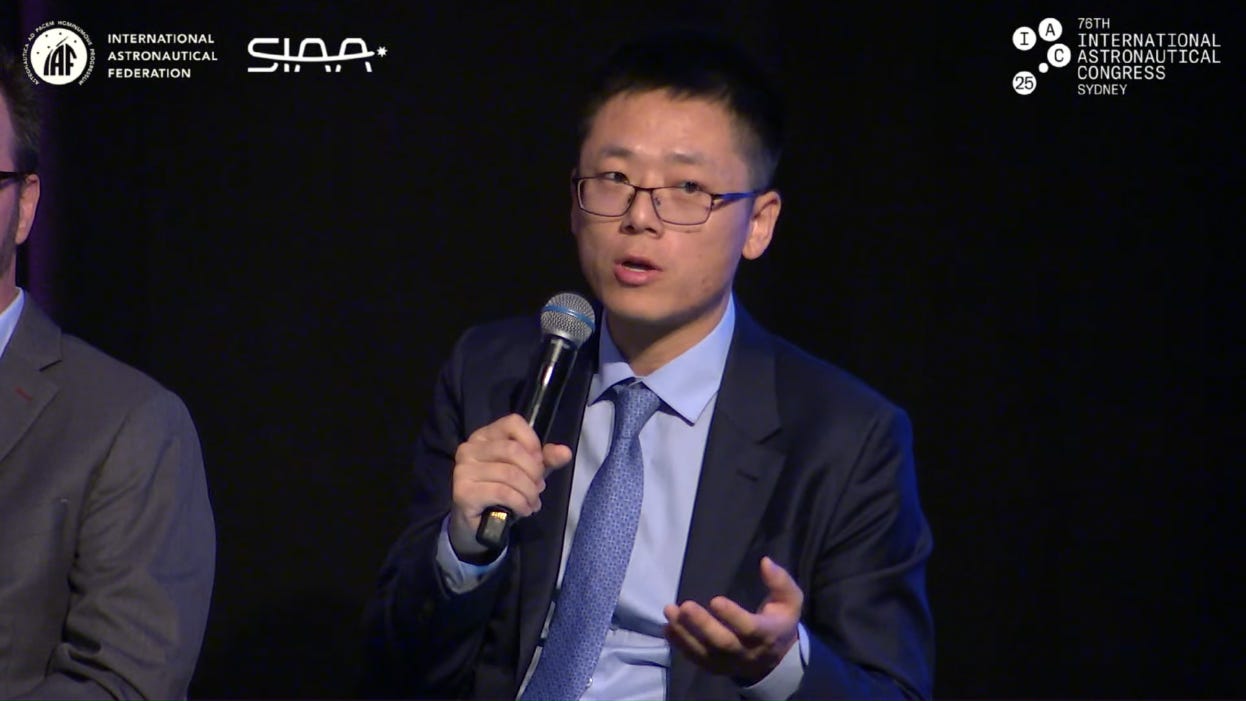Chinese, American Constellation Spacecraft Operators Would Like to Avoid Collisions Together
Meanwhile, GalaxySpace warns smaller constellations risk service interruptions to accommodate larger networks.

On September 30th, at the 76th International Astronautical Congress in Sydney, Australia, one of three panels took place featuring a representative from a Chinese space enterprise. That panel was From LEO to Lunar: Delivering Sustainable Innovation in Space (beginning about 10 minutes into the live stream replay embedded below), featuring GalaxySpace’s (银河航天) General Manager of the Solutions Department, Zhang Peng (张鹏), alongside representatives from the International Telecommunications Union (ITU), SpaceX, Amazon, and NASA.
In his opening remarks, Peng stressed that sustainable innovation at GalaxySpace is critical to the business’s plans for resilient operations, offering communications services for regular revenues, and for further development of the space sector and China. It was also noted that the company has developed a few dozen spacecraft to test constellation operations and provided operational satellites to the GuoWang (国网) network.
In talking about frequency spectrum use, Peng pointed out that GalaxySpace has a long list of laws and regulations to comply with while working with China’s Ministry of Industry and Information Technology (中华人民共和国工业和信息化部)1, which released plans to have millions of satellite communication users last month, as one way to work with the ITU alongside coordinating and collaborating with other Chinese spacecraft operators. Some of the regulations the company needs to follow are submitting documents covering planned orbits and technologies in use, as well as demonstrating safe use of the spacecraft and their communication frequencies, while also outlining debris mitigation plans for the end of a satellite’s mission.
Speaking on potential spectrum issues and priorities when asked by panel moderator Audrey Allison, of the Center for Space Policy and Strategy at The Aerospace Corporation, it was said that GalaxySpace’s priority and concern, being brought up through the ITU, is the fair and open allocation of frequencies. Alongside that is a desire for a system or mechanism to avoid frequency interference between terrestrial, very-low Earth orbit, low Earth orbit, and geostationary orbit networks in a non-costly way as constellations grow. Peng brought up that for smaller constellation operators, who have tens to hundreds of satellites, may have their services interrupted to not interfere with networks that have thousands of spacecraft, majorly affecting business revenues for the smaller of the two companies.
Later in the panel, Peng echoed a point from SpaceX’s David Goldman about the need for satellite operators to talk to each other to avoid potential collisions, as some spacecraft groups are being launched into the operational paths of others. At the moment, the constellation operators can coordinate and avoid each other’s communication frequencies after a dialogue through existing mechanisms, but cannot reach each other fast enough for safer collision avoidance, according to Peng and Goldman, who joked that they now have each other’s emails to do so. The ITU’s Jorge Ciccorossi jumped in afterwards to highlight that an upcoming forum will aim to develop a direct point of contact platform for satellite operators registered with the union.
Another point related to the issue of collision avoidance brought up was that of language barriers. Josef Koller of Amazon’s Kuiper used an example of the constellations team contacting a Korean satellite at risk of collision and being told that they did not order an Amazon package, before a Korean speaker was found to properly resolve the potential orbital collision. That example can be very relevant to collision mitigation solutions between China’s and America's constellation efforts due to the significant differences between English and Chinese as languages.
Related to collision avoidance, SpaceNews learned on the first day of the congress that Geovis Insighter Technology Co Ltd (中科星图股份有限公司) plans to launch a constellation of 144 space situational awareness satellites as a solution to monitor the rapidly growing number of low Earth orbit satellites and warn about potential collisions. Previously, Geovis has developed space situational awareness software for Chinese customers, including the national government.
As of 2023 directives, the Ministry of Industry and Information Technology is responsible for formulating plans and policies for the development and industrialization of high-tech industries, guiding the construction of national science and technology parks such as national independent innovation demonstration zones and national high-tech industrial development zones, and overseeing the development of science and technology service industries.


